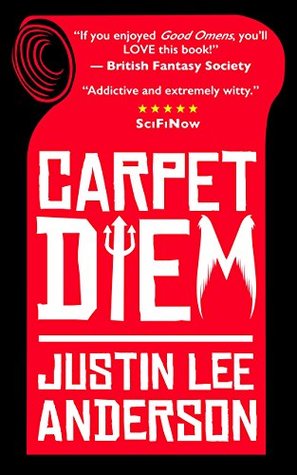|
Carpet Diem by Justin Lee Anderson is the story of Simon Debovar, a rich shut-in with an allergy to human contact (other than his drunk, lecherous Great Aunt Harriet) who gets drawn into a celestial competition between God and Satan that stands to usher in the end-times. He owns a very important rug, you see, and an angel and a demon show up at his house demanding that he choose which side gets it. The rug is stolen by a third party, and things spiral from there. The book uses a lot of elements you’d expect from the thriller genre, with many competing factions with murky and secret motives that are slowly revealed. As one character says, “Those who help you are not always your friends; those who oppose you are not always your enemies.”
This is an urban fantasy drawing from Christianity, but I wouldn’t call this a religious book, nor is religion used as the butt of jokes. Rather, it treats Christian elements as mythology and makes them its own with a little sass and parody to go around. I bring it up because using a real-world religion as the basis of a book’s mythos can be a touchy subject and it’s important to note that “Carpet Diem” takes a pretty neutral approach to the religion. It’s kind of like the movie Dogma in that respect, but with even less attention paid to the actual religion. Anyway, the book takes a fairly low-brow approach to humor. This is a book about drunk, horny people blundering their way through a world-saving adventure. Simon’s aversion to humanity and social awkwardness is a major source of humor, as is his instinct to assume that implausible worst about everyone he meets (such as jumping to the conclusion that the angel and demon who visit him at the beginning are planning to capture him and sell him into slavery based on absolutely no evidence). Aunt Harriet is a sexual wrecking ball. The ancient feud between pirates and ninjas even makes an appearance. Normally, I like to post a few choice quotes in these reviews to better demonstrate the style of humor. I failed you this time, and here’s why: The prose and humor in this book are incredibly smooth. The book just flows and builds on itself in a way that you can’t just pick out a funny sentence or paragraph. I was about 8% through the book before I even remembered I was supposed to be highlighting things, but everything is just so dependent on context that it’s hard to just throw some quotes at you. My advice is to read the first two chapters and see for yourself. If you want to see what happens when you cross “Dogma” with “The Big Lebowski,” or just need some comic urban fantasy in your life, give this one a read.
1 Comment
|
Review PolicyArchives
August 2018
Categories |


 RSS Feed
RSS Feed
